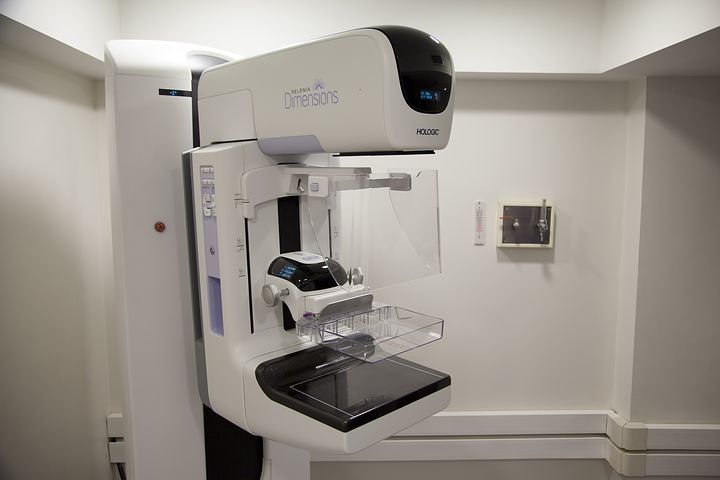
Why Does No One Want To Go Into Mammography?



Hi, I saw your post and talking to all the programs in the south this year, radiology was less competitive with our program receiving 60-80 fewer applications than last year. I state this because this year was not more competitive. But if you check the NRMP and look at the numbers instead of writing from your gut, you would not spread false information.
I will take a page from Barry and speak from my gut and say it is getting less competitive in the next few cycles with the horrors of taking candidates with no inclination for radiology via the SOAP to only fail the boards will start again. In retrospect, I wish that I had interviewed more students because many have already been to 20-30 places with their prepared responses.
Fellow program director
Not quite sure if y0u are a real program director since you did not leave an email or another way to contact you. Most folks that are “real” will put their money where their mouth is. Additionally, the grammar was horrible (so I took the liberty to edit it a bit), and the note was challenging to read. (But that does not disqualify you from being a program director!) Regardless, I thought it would be fun to reply to this email in an ask the residency director format, now that we know our program has matched all four spots. So, here we go!
First of all, the NRMP has not released any of the numbers about the 2019 match. They are not yet available. Can’t say that I know what figures you are talking about from the NRMP. (another red flag regarding the credibility of your post!) However, I find it interesting that you reported having 60-80 fewer applications this year. That statistic flies right in the face of what our program has experienced for this year’s match. And, it also differs from what I have heard other programs saying. But, then again, we will find out the actual numbers of the match statistics when the real NRMP releases the stats for this year.
Second, my article called 2018-2019 More Competitive For Radiology? A Midyear Perspective is just a perspective. I based it on the hard and soft facts of what we saw at our program at the time of the article. I use pieces of evidence to support the conclusion that this year was more competitive, not gut reactions. But again, we will see if my prediction bears out when we do get the final word from the NRMP.
Next, I want to put a pitch in for those folks that will be matching in the SOAP. What you are implying about the SOAP candidates could not be further from the truth. Our former residents that matched through this process have been some of the most dedicated and fervent radiology residents that we have ever had. Most residents that match through the SOAP do not fail their boards. To the contrary, these residents perform extraordinarily during their four years and beyond.
And, finally, I am sorry to hear that you wish you should have been interviewing more students. (if you are real!) I think that says more about your program and your region of the country than the state of the radiology match this year.
Too-da-loo,
Barry Julius, MD

Hello!
I am a U.S. Allopathic medical third-year medical student who is highly interested in applying for a residency in diagnostic radiology. However, I am concerned that my Step 1 score (227) will hinder my application. I ultimately would like to return home to California. However, I do understand that some of the most competitive residencies are in the Westcoast. Other than improving on my Step 2 score, what other steps could I take to increase my chances of matching? Do away rotations help, especially since I’d like to return home to the Westcoast?
Thank you!
Let me start by answering the end of the question first because I have received several requests to find out about if away rotations work to enhance the application. So, I like to say that away rotations are a double-edged sword. On the sharp-edged side, if you are the type of person that is outgoing and forms spontaneous connections with the folks you work with, then an away rotation can work well. You will be memorable to the admissions committee in a good way. On the other dull-edged side, if you are timid or not very remarkable, an away rotation can work against you.
When the admissions committee meets at most institutions, the program coordinator and the residents will usually speak up and say that a candidate did or did not work well in the institution. If the residents and program directors do not get to know you well, that can become a red flag.
For California specifically, as of this more competitive calendar year, your scores may prevent you from getting through some of the screening protocols at the residency programs. California programs for anything has become more and more competitive. Not that a score of 227 is terrible, but residency programs do have lots of applications to screen. And, some use it as a prelim screening criteria. I would imagine that some institutions may have higher minimums and some not.
That said, I would not let your USMLE scores dissuade you from applying to any institution. Many programs will deem your number to be adequate depending on what else you have accomplished during your residency. And yes, an improved Step II score will help your application a lot.
Assuming that you are still in the midst of your third-year rotations, the best thing that you can do to bolster your application is to do well on your clinical rotations at this point. The Deans Letter is the most scrutinized piece of the application. So, anything that you can do to improve that would be high yield.
And finally, if you have some time, I would try to pursue a short radiology project or two during the rest of the year. What kinds of projects? Well, case reviews or quick retrospective studies would be the types of projects that you should look for specifically. These sorts of projects show interest in the field of radiology and give you significant involvement in the field. At the bare minimum, it will provide you some talking points during interview season. And, at best, they will give you a few published or presented projects before the application screening/interview season begins.
Regards,
Barry Julius, MD

Hi,
Which is the radiology subspecialty with the best lifestyle and shortest/least taxing work hours? And how about lifestyle in body imaging?
From,
The lazy radiologist .
I love the question. Why? Because it reflects the purpose of my website: To get answers that no one else will give you!
In any case, as you may know, if you want to make good money, radiology is no longer a lifestyle specialty. Imaging volumes are up, and very few imaging centers will hire someone that cannot keep up with the work. And, if you are the owner of a practice, you will undoubtedly need to work hard. But, if you are willing to take lower pay and not work as an owner, then numerous lifestyle opportunities abound. Of course, you can always decide to work part-time three days a week and have a great lifestyle as a lazy radiologist! Most specialties will allow you to work part-time depending on the practice where you choose to look.
OK. So, let’s say that you are interested in working full time and want a relative lifestyle subspecialty. My recommendation to you would be to find something in the outpatient imaging sector. Typically, hospitals and urgent care centers that need radiologists to work on call will be significantly busier and will require you to work on off hours. And, being busy disrupts the whole lazy radiologist lifestyle thing!
Then, what are some of those specialties that are more conducive to outpatient imaging? My first thought would be breast imaging. First of all, you will find very few breast emergencies and call scenarios for a breast imager. Unfortunately, the daily volume of work can be difficult if you want to make a significant amount of dough. But, at least you may not have to take call!
What else? Teleradiology gigs will allow you to work on your own time when you want. Some of them have “dayhawk” needs. In this situation, you can have the ultimate flexibility if you decide upon this field. But, then again some teleradiology firms want night workers. That may not fit the bill for what you want so don’t choose that pathway if so!
Also, MSK imaging is not a bad choice for lifestyle-oriented radiologists. MR MSK imaging tends to be an outpatient phenomenon. And, you can find some outpatient centers willing to take on an MSK radiologist.
Body imaging would not be my first thought as a lifestyle specialty because most practices have expectations for you to read lots of studies and to do lots of procedures. Also, most practices will expect you to take call. However, certain workplaces do allow for a better lifestyle than others. You can find them if you look although they may not be lifestyle-oriented in the most “desirable” cities. (That’s just the way it is!)
Most other subspecialties also involve significant amounts of work and time. But, as you get on in years, you may also have more flexibility in choosing a more lifestyle-oriented pathway as well. For instance, many interventionalists become diagnostic rads and so and so forth. So, there is no reason why you can’t choose to change your “lifestyle” pathway along the way.
Finally, remember. To be good at anything takes a lot of work. So, you may need to sacrifice being a real expert for lifestyle. That’s just the way it is!
Hope that helps a bit,
Barry Julius, MD

Hello Dr. Barry Julius,
I am an M3 Osteopathic Medicine student. My interest in diagnostic radiology has drastically grown since I had the opportunity to shadow a few doctors. I was hoping to get your perspective on my situation.
Background:
– STEP1 score 244
– Research (5 publications with one first author. 3/5 were before Medical school)
– STEP 2 (have not taken yet)
Regarding diagnostic radiology, I can only apply to 30 institutions that offer H1B and accept DO students. Do you think that this number is optimal? Is it frowned upon to apply to another specialty as a back up since I have limited opportunities?
I greatly value your thoughts and opinion,
Canadian Osteopath
It’s not a question of what is optimal. More is better for a foreign grad. Unfortunately, most institutions will not look at H1B/DO candidates because each institution that sponsors an H1B candidate will have to undergo significant effort and expense. In the past, Saint Barnabas has opted not to take such candidates for that reason. The one exception was a candidate already accepted to another program within the system. However, Saint Barnabas usually avoids this situation. I think that the same situation applies to most other residencies as well. So, you will need to take what you can get and apply to those places that are willing to take on your situation.
When it comes to your credentials, they are excellent and sufficient for getting into radiology residency programs, But, it’s hard to say how everything will play out because of your H1B issue. Most residencies will choose other candidates first just because of the hardships of sponsoring an H1B. But, you never know and it is indeed still worth applying.
In terms of other programs, you should certainly go ahead and apply for the backups if this is what you want to choose. As I mentioned in another recent ask the residency post, you can easily rank multiple different residencies by tying the prelim and the advanced years together and classifying them as one entity in the system. I think that most residency programs will recognize that you need to rank other backup programs as well. But, make sure to let them know that you are interested in the field regardless of whether it is a backup or not.
Hope that helps a bit,

Dr. Julius,
I’ve stumbled across your blog and have enjoyed reading your content/advice. No, I didn’t see a specific scenario such as this (though maybe I am somewhat in the similar pool as an IMG), but what advice do you have for someone applying for radiology residency four years out from internship? First, I am a US graduate from an accredited MD medical school, completed an ACGME-accredited transitional year internship, and currently have my state license. Additionally, I have competitive step scores. Currently, I am now working as a general practitioner (GMO) in the military (hence the 4-year gap) with moonlighting work in urgent care/occ health. Also, I am beginning to engage with a local radiology program and am looking for research opportunities (currently only one publication and one poster presentation in my CV) to bolster my application. I feel that research is probably my weakest point. Is there anything else I should focus on to put myself in the best position to match?
Thanks for your time and consideration.
Let me be honest with you. It is more difficult to match with a gap in your application. The more years that you are out after internship, the more likely programs will discard your application sight unseen. Therefore, you will need more of an insider’s card and establish relationships with the programs. (as it seems you are doing) I would recommend that you should get to know the program director at your local hospital (if you have one). Or, you should work at a hospital with an accredited residency program so that you can get to know them.
However, what you do have going for your application is that you are in the military. The folks that I have worked with from the military have been more mature and stable. I think that can work in your favor. I would play that card. Moreover, make sure to let the residency know that you delayed your radiology training to complete the military requirements. That would take away the stain of a gap between your med school training and your application to radiology.
In terms of research, you are doing the right thing. I would try to get involved in a research project or two to show that you are involved and interested in radiology. Any bit can help when you are interviewing for spots.
To summarize, I would be sure to make it known that you are military and focus on that. That will put you way above the rest of the “gap” applicants. Moreover, I think that may take away the “gap” issue entirely and will give you a serious shot.
Dr. Julius,
Thank you for your advice. There is not a lot of advice readily available for GMO’s who separate from the military after their obligation and then enter residency as a civilian (whether it be Diagnostic Radiology or any other specialty for that matter) so I hope it can help other people in my position. I will certainly focus on the military accomplishments and experiences in my application/interviews. It has certainly taught me some excellent professional and “life” skills that I will use to try and stand out among the crowd.
Very respectfully,
The Military Guy

Hello Dr. Julius,
I am an aspiring Radiologist who is currently preparing for the USMLE exams. In the future, I plan to apply for Radiology residency as well as Internal Medicine as a backup. However, I am a little worried and confused about submitting my NRMP Rank order list when the time comes. Specifically, I would like to ask if it is acceptable to apply for a Radiology position, preliminary position, as well as a full 3-year internal medicine residency position at the same program. How would my rank order list look?
Also, what would be an appropriate response to give interviewers if they know I have applied for both a prelim position and a full three year IM position? I am worried about being in a scenario where I would not match into any program at all due to the improper listing of my Rank Order List.
Thank you for your time,
Concerned applicant
Good question! For confirmation about the process, I recently spoke with a few of my residents. Typically, you can tie the preliminary spots to the advanced radiology programs such that you need to match into a combination of the two or none at all. That can leave you with potentially hundreds of combinations and permutations depending on the number of programs you decide to rank. Furthermore, after you rank these tied together programs, you can then list the 3-year internal medicine programs. That way, you will rank any combination of a prelim and radiology programs more highly than a categorical three-year internal medicine slot. As you specified, you need to be careful to make the appropriate order when you create this rank order for the list. You may want to write down (on paper or electronically) the permutations before clicking the submit button!
I would have to say that the other more controversial question to answer would be what to tell the Prelim and Three Year IM Programs to which you are applying at the same place. In this situation, I firmly believe that honesty is the best policy. Any other tact would make you seem a bit ridiculous since they already will know your motivations.
Make sure to make it known that you enjoy medicine as well as radiology. And, tell the interviewers that you will perform exceptionally no matter which program you attend. Program directors most want to know that the folks beginning in their program will make it through to the completion of their residency. So, this strategy should satisfy the program director’s biggest concerns.
Hope that allays your concerns,

Dear Dr. Julius,
I have recently discovered your website, and I am amazed by your level of empathy and willingness to help. Your effort here is something quite unparalleled. I highly value taking and giving feedback, and after reading tons of your articles, I wanted to express how much I appreciate your work here on this website. Especially the last article gave me extra courage to contact you.
I am an FMG as well, and I am currently working as a full-time research fellow in the United States, and at the same time, I am studying for the steps. If I can take all three (Step I USMLE, CK and CS), I will apply for Match 2019, but I am not sure if I can make it till September. So what would be the latest date to upload my ERAS data to be on the safe side? I am afraid to make a hasty move that can ruin the whole application.
Secondly, how should I spend my time here to increase my chances of matching apart from my research? I truly believe this blog is a treasure so I will probably read all the articles (Yes, believe me!, that is what I usually do when I find something excellent to read) and give you more comprehensive feedback.
Also after reading all, I may find the courage to write an article myself and send it to you for a review but I must disclose that I am not well versed in writing at such a great level. I am looking forward to hearing from you and thanks in advance for your time and consideration.
Hi,
Thanks for the compliments. I have created to my blog to help out folks like you who are beginning. It’s tough out there!
Anyway, regarding your questions. First, I would make sure to get your applications in as early as possible. Often, programs will not interview those that have sent their applications in later. So, particularly as an international student, this would be critical. As soon as you get your scores back, I would recommend that you get that application in right away. Of course, don’t forget to edit it and check it over!
When you are doing your fellowship, I would make sure to get to know the program director and critical faculty in the radiology department. They often have significant connections that can help you to secure a position, whether in your fellowship institution or other programs as well.
Also, make sure to perform well in your fellowship. No slacking off (not that I believe you would). Put in that extra effort when you are there. Give great presentations and sound knowledgeable. Read a lot. Ask good questions.
These simple tasks will help you to create a good impression. And, any time you have an idea for an article, I would be happy to consider it for the website. I could always use a few more guest posts!
Good luck with the application process!
Barry Julius, MD

Hello Dr. Barry Julius,
I am a foreign medical graduate that finished Med School in 2016. During this 2 years I’ve been studying and taking the USMLE steps, I took my step I USMLE and got an unsatisfactory score of 209 for multiple reasons. Then, I took my step II CS, passed the first attempt, and received a step II CK score of 250. I have an upcoming paid rotation (very hard to find in radiology) in a large city for 3 months starting in February 2019. Unfortunately, I don’t see myself doing anything else than radiology. Since I grew up with it and came from a family full of radiologists back home, this is what I see myself doing and breathing.
Am I dreaming about getting into a radiology residency? Or, is it possible and should I keep on pursuing it? I have all the upcoming months to make my application stronger and more appealing to apply in 2019. I am thinking about taking the step 3 USMLE if that would help my application. However, I have heard mixed opinions about completing it before applying. Also, I don’t have any research. Moreover, I have also found conflicting information on the importance of research for radiology applications.
I would really love to enter a radiology residency but I want to keep it real. Can I have your professional opinion on whether it will be
Thank you very much for your response,
Concerned Applicant
Honestly, since you are a foreign grad, a score of 209 on Step I USMLE may limit your ability to obtain interviews. However, some programs may still give you one because you did so well on the step II exam. I think it is worthwhile to attempt the application process. You never know. But, I agree that it may be very challenging for you this year. You should temper your expectations for getting into a radiology residency.
In terms of the USMLE series, in your case, I would probably consider taking the USMLE Step III and try to ace the examination. A good score would confirm that the initial Step I exam results were a fluke. But, be careful. If you perform poorly on it, you can ruin your application. So, you need to study hard! (Not that I expect that you wouldn’t do so)
Also, it is often just as competitive to get into a prelim year prior to starting radiology residency. All foreign grads need a clinical year in an ACMGE certified program in the United States. So, make sure that you also apply for this as well. Foreign clinical programs are not a substitute.
Finally, as I’ve told some other foreign grads before, you need to make sure that you get to know the program director at the site of your paid rotation, This will help you get your foot in the door for an interview at least at that site. Also, this person can be a great resource to find a way to get involved in radiology research that can also bolster your application. Potentially, this person can also give you a good recommendation. That would help as well.
Let me know if you have any other questions,
Thank you very much for your answer. I have to apply to both programs at the same time, meaning the first categorical year and radiology at the same time. Is that correct? Is there a possibility to start a separate IM program and then transfer after the first year to radiology?
I think it’s a little bit easier to get into internal medicine residency for the IMG. And, some programs require a lower Step 1 grade. As per your advice, I will definitely take the step III before applying and try to complete some research. It is hard to find, but hopefully, during my upcoming rotation, I can get my hands on something.
Finally, I forgot to mention that I have a U.S. residency. So, I think that would improve my chances a little bit since I have seen lots of programs not interested in sponsoring VISAS, is this correct? I just want to make my case as strong as possible when applying to improve my chances, but I’m also considering internal medicine residency as another possibility because of my bad STEP 1 grade.
Thanks again for your reply,
Concerned Applicant
It is possible to start a separate internal medicine program and then transfer over to radiology. However, I would recommend applying to both a preliminary clinical year and the categorical program as well as the three-year IM program. But, I would make sure to rank the categorical radiology and prelim clinical year programs first. You should be able to use the IM three year program as a backup if all else fails.
And, I agree. U.S. residency will help you a bit to secure a residency slot. It’s one less
Good luck!
Barry Julius, MD

Hello, Dr. Julius. I am a foreign medical graduate in my third year of medical school, and I want to apply for a radiology residency after graduation. I wanted to know from your perspective what would make a foreign grad application stand out and prompt you to interview them.
Thank you for taking the time to answer my question!
Regards,
Want To Stand Out
To begin with, not all foreign residents are equal. I like to classify foreign medical grads into a few separate categories. First, you have the foreign medical grads who are United States citizens and have passed the USMLE exams. These folks tend to have the most excellent chance of acceptance because they do not have any VISA issues.
The second type of applicant is not a United States citizen but has also graduated from a foreign radiology residency in addition to an international medical school and has passed the USMLE exams. These graduates are usually a bit higher up on the totem pole because they have loads of experience to bring to a radiology residency program.
To categorize the rest, you have the non-US citizen foreign grad who has completed the USMLE series. Finally, the last group is non-US citizen foreign grads who have not completed the USMLE.
Depending on which category, your chances of an interview will vary dramatically. If you are part of the first category, you have the best chance of an interview. Instead, you have almost no chance if you are in the last group.
Regardless of which category, some U.S. radiology programs will not even look at your application if you come from a foreign medical school. So, you cannot expect to have as many interviews as a U.S. graduate. However, if you have U.S. citizenship, the odds are a bit higher.
Oh, and one more thing. Since the ACGME merged with the AOA, a D.O. graduate in the United States has the same options for residency as an M.D. Separate D.O. residencies will no longer exist. So, in effect, unfortunately, the increased pool of these non-MD candidates decreases the chances of obtaining an interview as a foreign grad.
What can you do as a foreign grad if you are in any of these groups? First, I would recommend getting to know the program director and faculty to get the “inside track.” Often, personally knowing the faculty may be the only way to get an interview as a foreign grad. So, that would be my first strategy. What else? Participating in research or an observership can also help the foreign grad. Finally, the board scores of a foreign grad will often need to be significantly higher than an American grad to receive an interview.
Also, I received a lot of questions about how to apply. Most programs will not even look at your application unless you go through the ERAS system. So, make sure that you are filling out the ERAS application! And, unless it is a unique circumstance, don’t even bother to apply to a program without going through the online system.
I hope that answers your question,
Barry Julius, MD

Join our mailing list for free to receive weekly articles and advice on how to succeed in radiology residency, the best ways to apply, how to have a successful radiology career, and more. Also, get a copy of the free ebook Called The New Attending Physician Guidebook: How To Search For The Right Job And What To Do Once You Start.